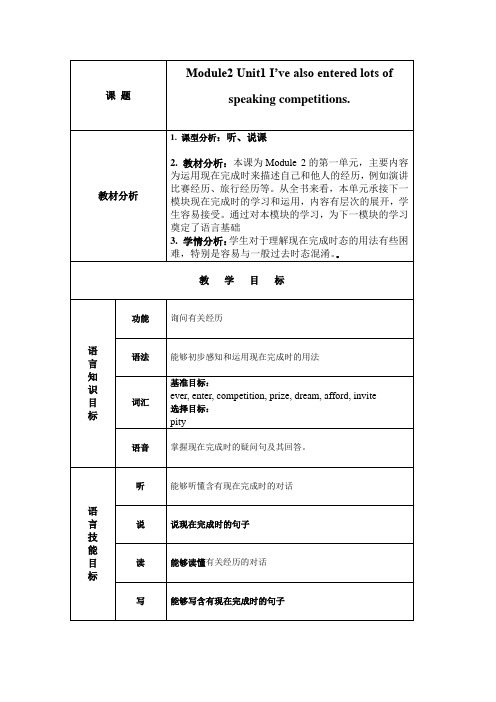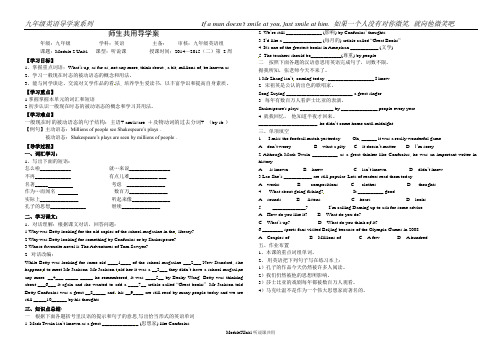英语学案.doc Module2U 1听说课
- 格式:doc
- 大小:110.00 KB
- 文档页数:5


Unit1 Have you ever entered a competition?(课例)第一课时听说课一、教学内容分析二、课堂教学过程课后反思:通过平常上课,我发现大多数学生对英语学科充满了求知的愿望,但有些同学可能由于自己英语基础不是很扎实,表现的不是很积极。
所以为了开好本节课,我一方面通过设计简单的问题来提问;另一方面通过假设我要乘飞机,但我不知道如何去做,来让乘坐过飞机的学生来帮助我,没有坐过的我们一起来学习方式导入新课;这样可以激发学生学习英语的兴趣,同时可以拉近老师与学生的关系,以提高学生的积极性。
通过这样做,本节课的课堂气氛还是可以的。
在本课,新单词的呈现是通过与实物对照的方式完成的,以此来完成听力部分;由于课本的图片较单一和有些单词没有出现,所以我用幻灯片播放出一些听力内容涉及的单词、图片,这样更加适用与逼真,这样有利于教学教学任务的完成。
在进入对话部分时,先让学生先听对话,然后完成后面的习题,这样可以锻炼学生的听的能力;本环节总共听了3遍,第一遍统观全文,回答两个简单问题;第二遍则稍有难度,在第一遍的基础上完成表格,完不成则通过阅读来完成;第三遍则跟读录音,模仿录音当中的语音语调。
同时,学习课文中的知识点,并仿照例句自己造句子,学以致用。
本堂课的主要任务是学习现在完成时的基本结构:“have/has done”,比较单一,也比较简单,所以要从面上辐射到大部分学生,特别是困难生,要让他们起来积极做对话,在说的同时掌握其基本结构。
最后一个环节,让学生自己归纳总结现在完成时的结构,同时教师对此结构要下个概念:现在完成时,讲解时不要太深和复杂,否则完不成教学任务。
在本节课中大部分同都能积极参与课堂活动中来,课堂气氛活跃,能够完成教学任务;在讨论的过程中融入真实的交际,让学生们在不断地练习中获得成就感,让学生在快乐中学习,在学习中找快乐。

Module2 Unit 1 She’s listening to the radio (教学设计)教学目标1.学生能够听、说、认读单词:listen, radio, watch, TV。
2.学生能够掌握句型“She’s listening to the radio.” 和“He’s watching TV.”。
3.学生能够用英语描述人们正在做的事情。
4.学生能够通过角色扮演和游戏等形式巩固所学内容。
教学重点1.学生能够掌握句型“She’s listening to the radio.” 和“He’s watching TV.”。
2.学生能够用英语描述人们正在做的事情。
教学难点1.学生能够听、说、认读单词:listen, radio, watch, TV。
教学准备1.PPT。
2.单词卡片。
3.课本。
教学过程Step 1 导入新课1.通过播放音乐和放电视节目的视频让学生对“listen, radio, watch, TV”这四个单词有初步了解。
2.出示单词卡片,让学生和老师一起读单词,并将卡片放在正确的地方。
比如将“listen”卡片放在音乐播放器的图片旁边,将“watch”卡片放在电视机的图片旁边等等。
Step 2 学习新知识1.出示图片“She’s listening to the radio.” 和“He’s watching TV.”,通过图片引导学生掌握这两个句型。
2.将句子翻译成中文,并让学生读一读中文翻译,加深对句子的理解。
3.通过朗读句子和展示图片让学生学会读这两个句型。
Step 3 合作学习1.分别让学生找一个搭档,练习说这两个句型。
让他们使用上面学到的单词和句型,进行对话练习。
2.角色扮演,让学生分别扮演不同的角色,描述人物正在做的事情。
Step 4 巩固练习1.让学生通过小组活动小组展示他们刚才的任务练习成果。
2.让学生在课本上完成相关练习,以检验他们对所学内容的掌握程度。

九年级英语导学案系列 If a man doesn't smile at you, just smile at him. 如果一个人没有对你微笑, 就向他微笑吧.Module2Unit1听说课共用师生共用导学案年级:九年级 学科:英语 主备: 审核:九年级英语组 课题:Module 2 Unit1 课型:听说课 授课时间:2014—2015(二)第 2周 【学习目标】1、掌握重点词语:What ’s up, as far as, not any more, think about , a bit, millions of, be known as2、学习一般现在时态的被动语态的概念和用法。
3、能与同学谈论、交流对文学作品的看法, 培养学生爱读书,以丰富学识和提高自身素质。
【学习重点】1.掌握掌握本单元的词汇和短语2.初步认识一般现在时态的被动语态的概念和学习其用法。
【学习难点】一般现在时的被动语态的句子结构:主语+ am/is/are +及物动词的过去分词+ (by sb.) 【例句】主动语态:Millions of people see Shakespeare’s plays .被动语态:Shakespeare’s plays are seen by millions of people . 【导学过程】 一、词汇学习: 1、写出下面的短语:怎么啦____________ 就…来说________________ 不再______________ 有点儿难___________ ___ 名著_____ 考虑 _______________ 作为…而闻名 数百万_______________ 实际上_______________ 听起来像_______________ 孔子的思想______________ 继续_______________二、学习课文:1、对话理解:根据课文对话,回答问题:1.Why was Betty looking for the old copies of the school magazine in the library? 2 Why was Betty looking for something by Confucius or by Shakespeare? 3 Whose favourite novel is The Adventures of Tom Sawyer?2. 对话改编:While Betty was looking for some old ____1____ of the school magazine ___2___ New Standard, s he happene d to meet Mr Jackson. Mr Jackson t old her it was a __3___ they didn ’t have a school magazi ne any more. __4___ _____ _____ he remembered, it was ____5__ by Becky Wang. Betty was thinking about ___6___ it again and she wanted to add a ____7__ article called “Great books ”. Mr Jackson told Betty Confucius was a great __8_____ and his __9____ are still read by many people today and we are still _____10______ by his thoughts.三、知识点总结:一 根据下面各题括号里汉语的提示和句子的意思,写出恰当形式的英语单词 1. Mark Twain isn ’t known as a great ______________ (思想家) like Confucius. 2. We ’re still ______________ (影响) by Confucius ’ thoughts . 3. I ’d like a _______________ (每月的) article called “Great Books ” . 4. It's one of the greatest books in Ame rican ___________ (文学). 5. The teachers should be____________(尊重) by people.二 按照下面各题的汉语意思用英语完成句子,词数不限。

Step3. Presentatio nStep4. Listen and read (Activity 3)Step 5. Read and practice (Activity4& Unit 3Activity 4) Ask three questions:①. Do you think what Chen Hua is?②. What did Sally call Chen Hua for?③.Chen Hua will interview Sally, do you think whatpersonal questions will he ask Sally?1. Students listen and try to get what personal questions Chen Hua asked and then present the four sentences.①.Can you tell me where you are from?②.I’ve heard that you play in your school orchestra. (That means: what’s Sally’s school orchestra getting along with?)③.Can I ask you if you miss the UK, or your relations?④.What does China feel like? (That means: What do you think of China?)2. Students read the dialogue carefully and work in groups to find out the answers to the personal questions, students guess the meaning of the new words and phrases.3. Students read after the tape and help them overcome some difficulties about comprehension.1.Read the dialogue aloud and keep books closed, check the true sentences in Activity 4①. Chen Hua has already met Sally.②. Sally is waiting for Chen Hua to arrive.③. Sally doesn’t know who will come to their last public concert.④. Sally thinks the word “foreigner” isn’t friendly.⑤. Chen Hua invites Sally and her friends to visit Radio Beijing.2.Do Unit 3 Activity 4 individually, then discuss in pairs if they have any questions, check answers together and then。

Module 2 Public holidaysUnit 2 We have celebrated the festival since the firstpioneers arrived in America. Ⅰ.Teaching modelReading and writing.Ⅱ.Teaching methodTop-down approachⅢ.Teaching aims (教学目标)1. Read to learn about the history of Thanksgiving and how people celebrate it in America.2. To learn to write a passage about a festival with the helpof writing strategies3. To learn some new words and expressionsⅣ.Teaching ObjectivesKeyvocabulary:among ,speech,pioneer,grow,corn,following,lay,lay thetable,over,dish,ourselves.Key structures: Learn to use adverbial clauses with since,while, after, before ,when.Ⅴ.Teaching aids: Recorder, OHP, videoⅥ、Teaching Steps (教学步骤)Ⅰ.Leading in . (情境导入)Step 1 .Warming-up(Ⅰ情境导入--1.师友对话)1. Review the words and phrases of Unit 1.2. Introduce the new words.(师傅学友明确学习任务:师傅注意纠正学友的发音)Step 2. Complete the sentences.(Ⅰ情境导入--1.师友对话)Look at the picture and talk about it(Activity1)(Ⅰ情境导入--1.教师导入)Ⅱ.Reading comprehension(阅读理解)Step 3. Reading.(Ⅱ阅读理解--1.师友阅读)友情提示:师友独立完成任务,再互助交流Task 1 Read and answer1. Play the recording.2. Ask the students to read through the passage.3.Read the passage and match the headings with the paragraphs.(Activity2)3. Read the passage and complete the table.(Activity3)4. Check with a partner.5. Call back the answers from the whole class.6. Read the text together.(Ⅱ阅读理解--1.师友朗读)友情提示:请朗读,师傅注意学友的语音语调.Task 2 Complete the passage with the correct form of the words and expressions from the box.(Activity4)7. Learning to learn.(Ⅱ阅读理解--2.教师点拨)教师引导学生找出课文中重点短语和句子。
Module2 Unit1 She’s listening to the radio(说课稿)一、课程目标1.学习并掌握用英文表达正在进行的活动的句型。
2.进一步锻炼学生的听说能力,提高学生的听力水平,能听懂简单的听力材料。
3.通过本课程,让学生学会利用所学单词和句子描述他人正在进行的活动,增强他们的交际能力和语言表达能力。
4.提高学生的学习兴趣,激发他们学好英语的热情。
二、教学准备PPT、课件、挂图、录音机、教学实物等。
三、教学重难点1.教学重点:本课程的重点是让学生掌握用英文表达正在进行的活动的句型,并能正确使用。
2.教学难点:教学难点在于让学生掌握句型的背景知识和正确的词序,以及良好的口语表达能力。
四、教学过程1. Warming Up通过图片展示串连学生和老师之间的对话,使学生预览学习内容,并引导学生从对话中获取所需的背景知识。
2. Presentation通过几个形象的动作展示,引导学生感受句型的实际意义和用法,并让学生自己运用单词和句子描述所看到的动作,帮助他们理解和记忆这个句型。
3. Practice让学生以小组为单位,每组两人,进行对话练习,诱导学生使用正确的句型,增加对句型的熟练掌握和运用能力。
4. Listening and speaking播放听力材料,让学生仔细听,听懂并模仿主播描述的所听到的正在进行的活动,并以小组为单位,商量讨论如何合理的运用所学到的语言知识进行描述。
5. Production通过引导学生自己运用所学到的语言知识,解决实际生活中的问题,增加学生的实践能力和语言运用技巧。
五、教学评价通过观察和听取学生对话的表现,评估他们对句型的掌握情况,提出自己的观点和建议,帮助学生更好的提高个人能力和语言素养。
六、作业布置1.让学生回家使用所学知识写一篇描述正在进行的活动的短文,并用正确的句子将句子串联起来。
2.让学生预习下一课,提前了解下一单元的内容,做好学习准备。
Module 2Experiences◎知识导航主题语境:人与社会子主题:跨文化沟通与交流,语言与文化1.语言知识:在口语和书面语篇中理解、体会现在完成时的形式及其用法。
2.文化知识:让学生通过写与旅游经历相关的记叙文,了解不同国家的语言和文化,建立文化自信,并学会欣赏不同的国家文化。
3.语言技能:能认真倾听他人的表述,并作出恰当回应。
4.学习策略:从形式、意义和使用三个角度学习现在完成时,发现它的规律并能举一反三。
Unit 1I've also entered lots of speaking competitions.课型:听说课◎预习试炼请预习下列重点单词、短语和句子,并完成下面的表格及相关训练(标•的为重点单词拓展内容)。
单词和短语重点单词名词1.比赛;竞争competition•(v.)比赛compete•与……竞争compete with2.奖品;奖项prize•(短语)一等奖first prize动词3.(使)参加;(使)报名enter4.(有财力)买得起,付得起afford•(短语)负担得起做某事afford to do sth.5.邀请invite•(短语)邀请某人做某事invite sb. to do sth.•(n.)邀请;请柬invitation副词6.曾经;从来;在任何时候ever兼词7. (n.)梦;梦想;[只用于名词前]梦寐以求的(v.)做梦;梦到;梦想dream•(过去式)dreamed/dreamt•(过去分词)dreamed/dreamt•(短语)梦想;梦见dream of/about根据语境或提示,完成填空。
1.What's the prize (奖品)for the speaking competition?2.Jessie invited (邀请)me to come to her birthday party last week.3.I have ever entered (参加) a photo competition.4.I have a dream (梦想)that I can visit the Great Wall with my family one day.5. David lost the game. What's a p ity!6. This bike costs 12,000 yuan. That's so expensive that I can't afford it.7. You need to do more sports and watch less TV.8.To win the competition, you need to write a moving story about a film you've seen. 9.Lucy will make up a new story. The story is about a man from Mars.佳句仿写请在教材中标出下面句子,并用句中黑体词或短语仿写句子。